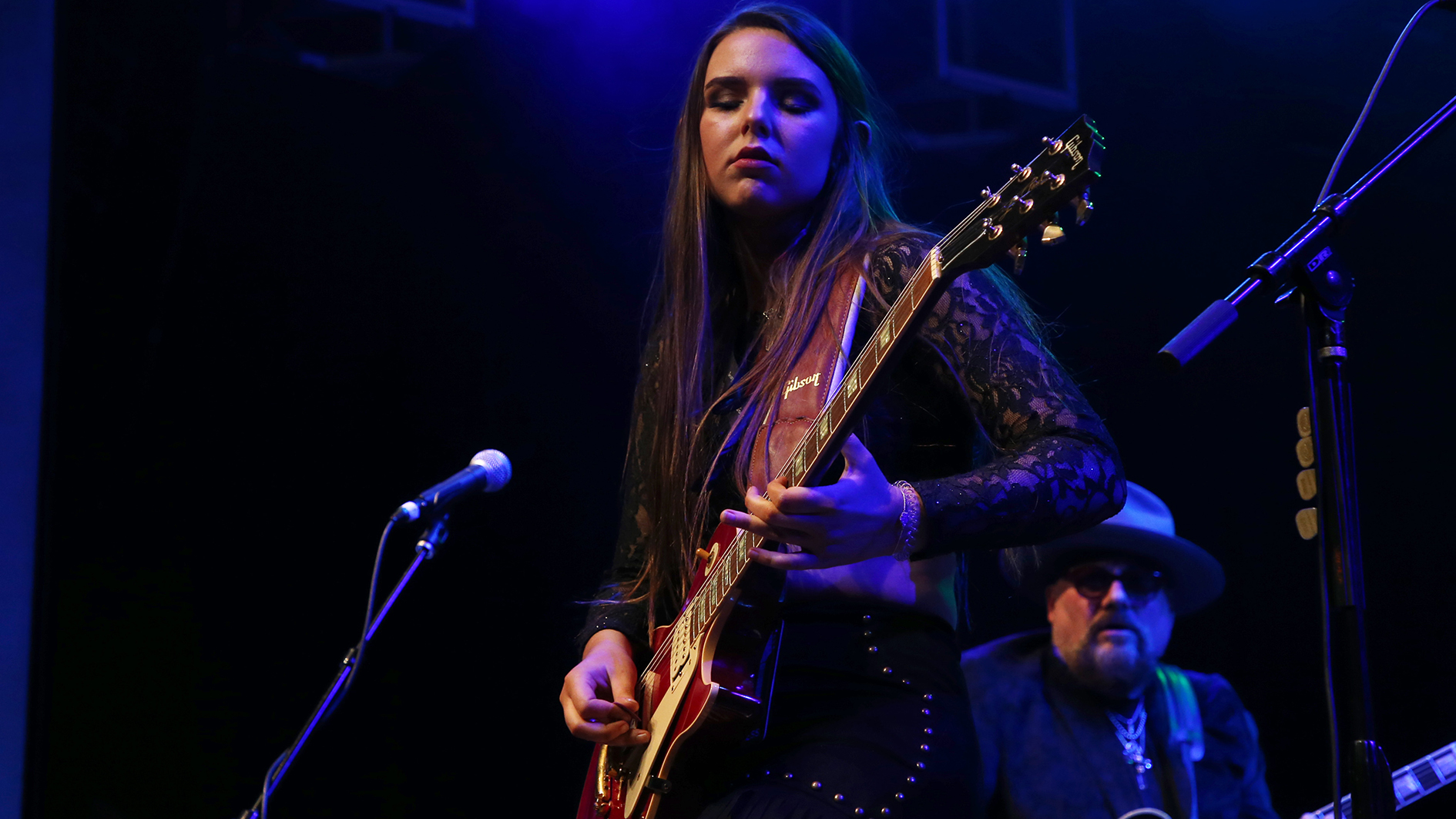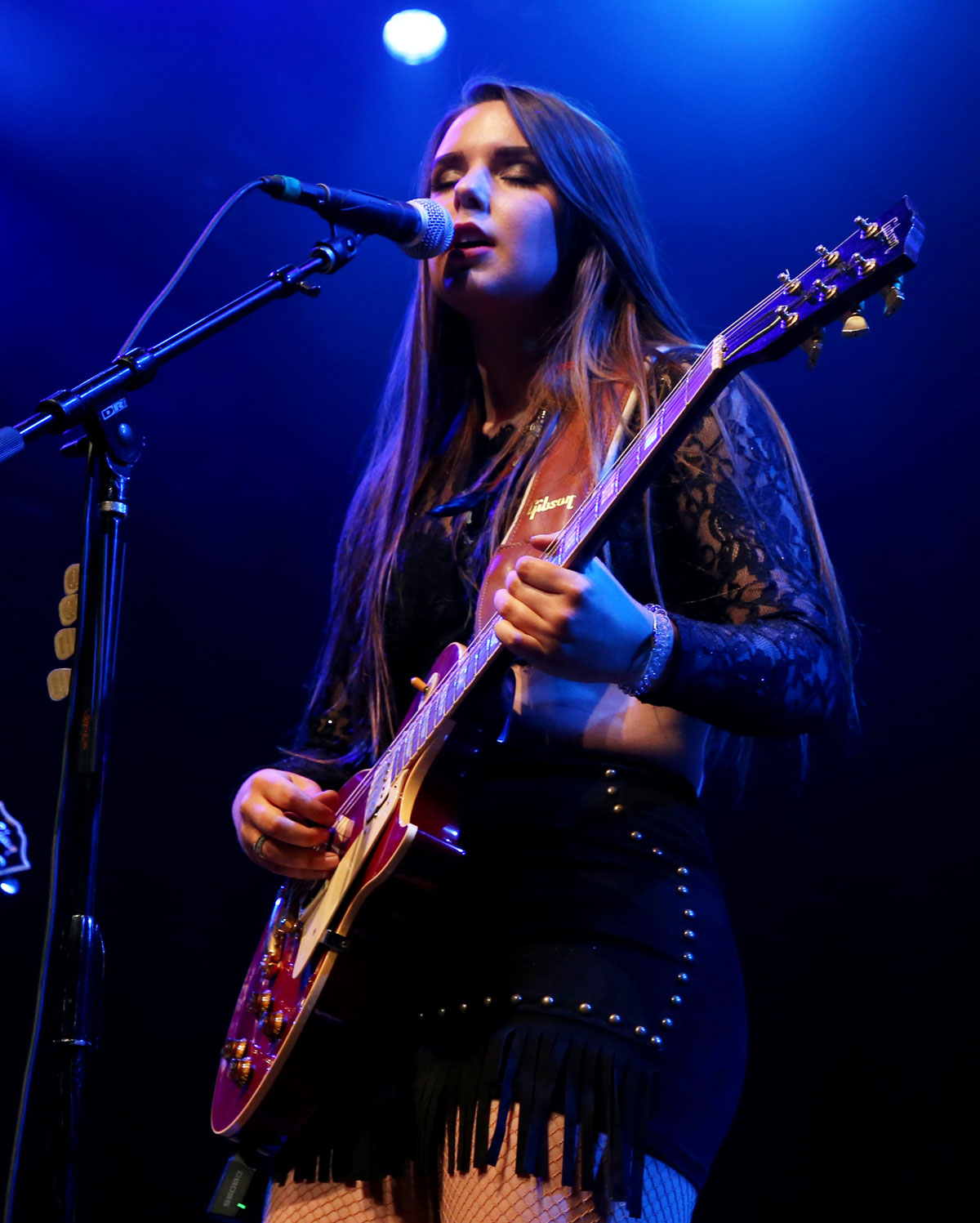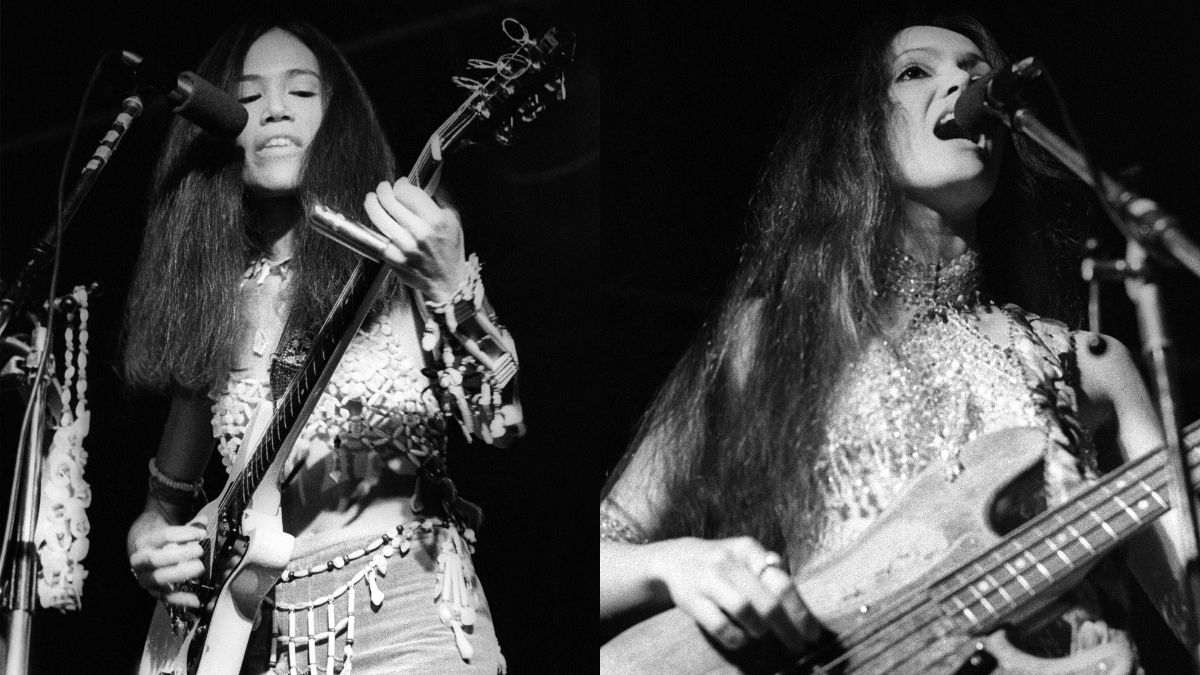Ally Venable: “What got me into the blues was discovering Stevie Ray Vaughan – that turned my whole world upside down”
The Texas-bred, Les Paul-toting blues wunderkind talks collaborating with Kenny Wayne Shepherd on her latest full-length, Heart of Fire, releasing her debut EP at 14, and why performing onstage is the ultimate antidote to social anxiety

All the latest guitar news, interviews, lessons, reviews, deals and more, direct to your inbox!
You are now subscribed
Your newsletter sign-up was successful
Deep from the heart of Texas, Les Paul-wielding songwriter Ally Venable is doing her best to carry the torch as a guitar hero for the modern age.
With music steeped in blues tradition, and tinged with touches of Zeppelin-cool-meets-Stevie Ray Vaughan-mysterious, over one EP and four full-length records, Venable has picked up a destructive head of steam.
And now, with her trusty magenta Les Paul slung over her shoulder, Venable is poised to make tsunami-level waves among a bristling blues-rock scene.
Here, during a break from the road, Venable settles in for a chat via phone to discuss her formative years, songwriting approach, her love for '90s Les Pauls, and what keeps her grounded amid waves of prescribed chaos.
What was your introduction to the guitar?
“I started playing guitar when I was around 12 years old; I'm 23 now. When I was little and growing up in Kilgore, Texas, my grandma taught me how to sing, and from there, I just wanted to play guitar because even though I loved to sing, something about the guitar intrigued me.
“At first, I just wanted to play for my family and my friends, and I would take requests from them. That worked well for me because I could quickly learn things and play them almost immediately. And the more I did that, the closer I got to the guitar, to the point where I felt deeply connected.”
All the latest guitar news, interviews, lessons, reviews, deals and more, direct to your inbox!
Who were some of your early influences?
“I liked Miranda Lambert when I first started singing. That doesn't influence me as a guitarist in terms of sound, style, or tone per se, but I liked her attitude. But what got me into playing the blues was discovering Stevie Ray Vaughan – that turned my whole world upside down.
The blues is my outlet to say what I'm feeling. It's a way to connect and let go of what I'm going through without being too personal
“From the first moment I heard Stevie play, it threw me down this rabbit hole of other blues artists. I think what connected me to the blues through Stevie was not only his voice and his playing but that he had this mysterious way about him.”
Would you say you've got the blues coursing through your veins now?
“Oh, for sure. I connect with the blues in a way that I don't connect with other styles of music. I look at it like this: everybody goes through things and has struggles and obstacles in life, and we need a way to express that.
“So, the blues is my outlet to say what I'm feeling. It's a way to connect and let go of what I'm going through without being too personal. And when I play the blues live, it's a way for me to convey that we're in it together, and I think that's why I play the guitar the way I do. It's something that's inherently there but can't be explained.”

After picking up the guitar at 12, you had your first EP out by the time you were 14. That's quite the progression.
“Yeah, it is! I just liked writing songs; I'm always writing songs, and I've always been that way. Even at that young age – I'm still young – I wanted to express myself honestly, and writing songs felt like the best way to do that. I had no idea if anyone would listen to them – that never occurred to me – but it was just something I needed to do.
“I like writing about what happens in my life or something that I think might be able to relate to somebody else. But like I said, I'm only 23, so there's a long way to go because as we get older, we go through different experiences. You're not the same person at 21 that you were at 18; you're constantly evolving, growing, and going through things.”
I'll always love the blues, and it's always going to be present in my music, but I wanted to stretch out more, and to do that, I felt like I had to steer my music in a rock direction
One noticeable shift in your sound is it seems to be erring in the direction of rock of late.
“That's true. I have been working more in a rock direction with my songs, and that's because I wanted to create those types of sounds with my guitar. I will always love the blues, and it's always going to be present in my music, but I wanted to stretch out more, and to do that, I felt like I had to steer my music in a rock direction. It's not full-on rock – it's never going to be that – but I'd say it's blues with a rock vibe, but my solos have been more hard rock, with blues phrasing.”
You've had the pleasure of working with Mike Zito. How did that experience shape you?
“Oh, that was so much fun! So, Mike came through Kilgore, Texas, where I live, and he invited me to open for him, and we became friends. And from there, Mike introduced me to the people at Ruf Records because he knew they were looking for new artists, so he got me into that world.
“And when it came time to record Texas Honey, I immediately thought of him and asked if he wanted to be a part of it. I was excited when he said yes, because he's good at making things fit how they're supposed to be and taught me a lot about putting the puzzle together.
“So, after the record was done, we played some more shows with Mike, and I mentioned I was looking for a title. And he said, ‘Well, I'm not sure what you should call the record, but I think you need a nickname.’ I was like, ‘Oh, yeah? What would I call myself?’ And Mike looked up, and then he said, ‘I know! How about we call you 'Texas Honey?'’ And while that nickname didn't stick, it made for a great album title. [Laughs]”
I would be remiss if I didn't mention your guitar duet with Kenny Wayne Shepherd on Bring on the Pain, from your latest album, Heart of Fire.
“It was so amazing to work with Kenny, especially since he's supported my work. I'm grateful to have him as a friend and somebody I can call for advice. So, I called Kenny up and asked, ‘Hey, would you want to play on the record?’ And immediately, Kenny said, ‘Yeah! Just tell me what song you need me on, and I'll look it over and make it happen.’
“Of course, he killed his solo. After listening to what he did on Bring on the Pain, I was like, ‘Wow. You brought this to a whole new level; I love it.’ I'm so happy with that song and what Kenny did with it. I honestly cannot say enough good things about Kenny.”
Are you a visceral player or more of a calculating type?
“That's a good question. I'd have to say that I fall somewhere in the middle. I try to play with feeling because the way I express myself is by playing my guitar. And, of course, no one person can play exactly like the other; you can try, and you might get close, but you'll never do it the same.
I've never been a social butterfly and tend to be very quiet if I don't have my guitar. But when I'm on stage, I feel the most comfortable; all the fear disappears, and I'm entirely in my element
“I feel the guitar is about your energy, where you're putting your fingers, and the way you attack. Everybody has their own thing while playing, which is what's so cool about it.
“So, I never try to play in a way that people expect me to or in a style that people expect to hear. I like to cut loose and not worry about playing note for note. I think the guitar is about feeling and expression, which has to flow out of you when you play.”
Would you say you feel more yourself in a live setting than in the studio?
“I feel like I pour so much into my live shows, so I feel like myself when I am on stage. I'm always on the road, so I've grown accustomed to that setting. I feel comfortable with the studio, but playing live is what does it for me. Playing live makes me feel like I belong there, and that's what I love most.
“When I play live, I can be anywhere, even if it's far from home, and I never feel out of place. I've never been a social butterfly and tend to be very quiet if I don't have my guitar. But when I'm on stage, I feel the most comfortable; all the fear disappears, and I'm entirely in my element.”
You've become synonymous with the Gibson Les Paul. What first attracted you to it?
“I just love the sound of humbuckers and the feel of a Gibson Les Paul. Especially with my Heart of Fire record, which has a rockin' sound, I felt I needed my Les Paul more than ever.
“But I've always used them because I feel like Les Pauls give off a classic, dirty sound, and they're just fun to play. I have a few different guitars, but I always go back to the Gibson because other guitars require different approaches to playing, but I feel best with a Gibson.
“For example, when I play a Strat, I'm gonna play it just a little differently than my Les Paul because the action, weight, and fluidity are different. But the one I use the most is a magenta Les Paul that Gibson made in the '90s.
I know a lot of players love the '50s and '60s Les Pauls, but I have to say, I love my mid-'90s magenta Les Paul
“I know a lot of players love the '50s and '60s Les Pauls, but I have to say, I love my mid-'90s magenta Les Paul. Back then, Gibson did a run of limited colors, and mine is one of them, so that's my main guitar and has been for some time.”
I heard through the grapevine that you're working on your next record. Can you divulge anything?
“Well, I don't know. [Laughs]. I can't say much, but I can tell you what I've been working with the great Tom Hambridge. He's an amazing producer and drummer with Buddy Guy and his band, and it's an honor to work with someone like him.
“And we've been recording in Nashville with many great studio musicians, and I'm excited about it. I can't say much more than that yet, but I can say if you liked my last one, then just wait until you hear this record. It's going to be special.”
Having accomplished so much at such a young age, how do you remain grounded?
“First and foremost, no matter what happens, I never see myself not doing this. I see myself continuing to make music and writing about my life. I want to try new things in the studio, play with different people, and travel the world. It's cliché, but my music keeps me grounded, and I want to keep making music, touring, and just enjoy my life. We're only here for so long, so we've got to enjoy it.
“Aside from that, my family, friends, and Siberian Husky, Kai, all keep me grounded. Outside of music, that's what keeps me going. I also try to be self-aware of who I am and what I was put on this earth to do. I try not to take myself too seriously because, at the end of the day, I'm just a girl who likes to play guitar.”
- Heart of Fire is out now via Ruf Records.
Andrew Daly is an iced-coffee-addicted, oddball Telecaster-playing, alfredo pasta-loving journalist from Long Island, NY, who, in addition to being a contributing writer for Guitar World, scribes for Bass Player, Guitar Player, Guitarist, and MusicRadar. Andrew has interviewed favorites like Ace Frehley, Johnny Marr, Vito Bratta, Bruce Kulick, Joe Perry, Brad Whitford, Tom Morello, Rich Robinson, and Paul Stanley, while his all-time favorite (rhythm player), Keith Richards, continues to elude him.



